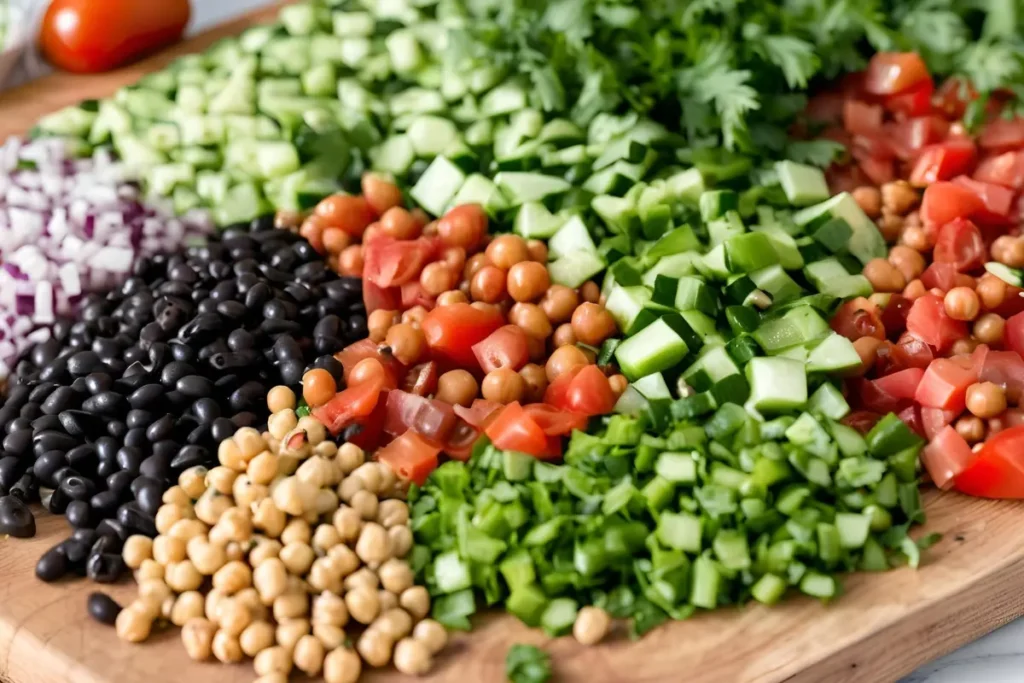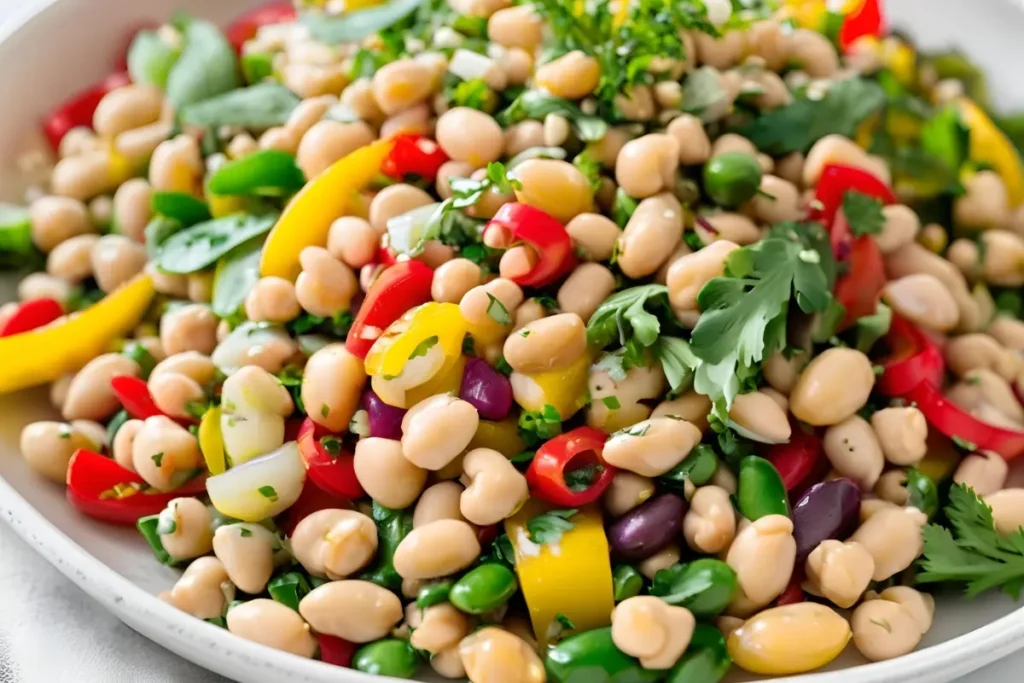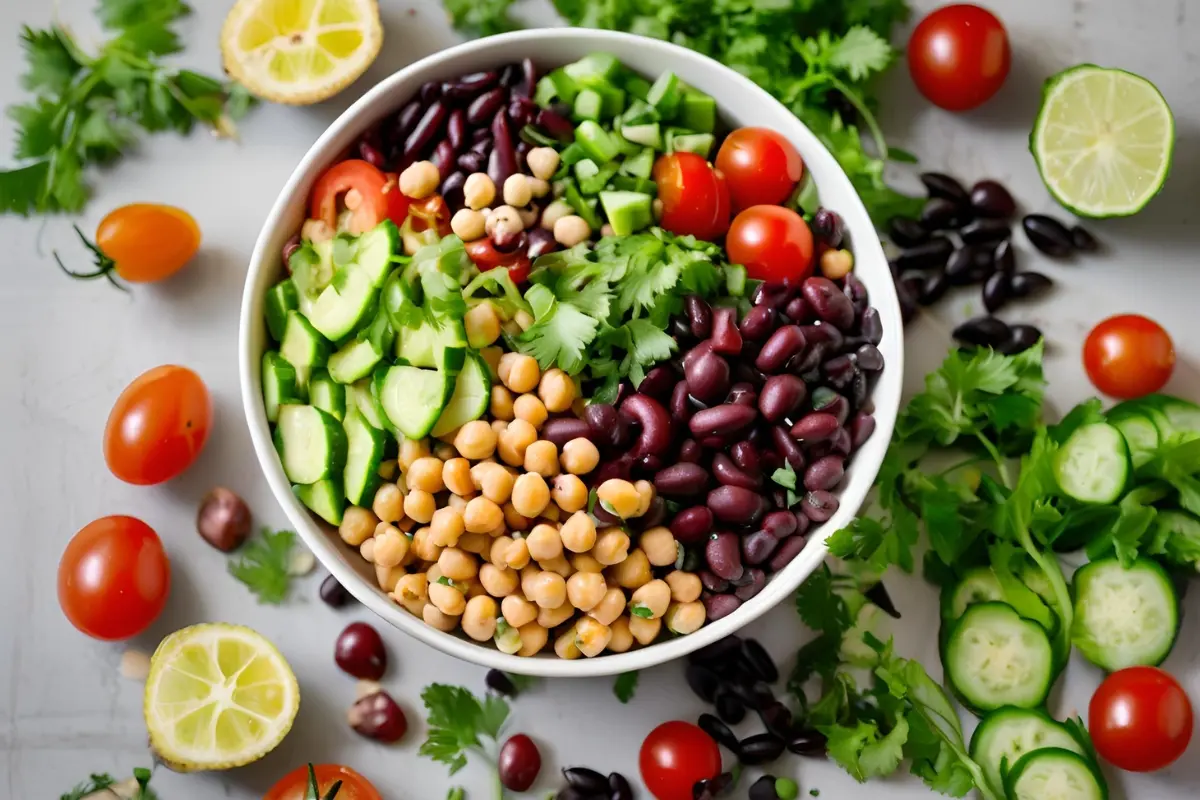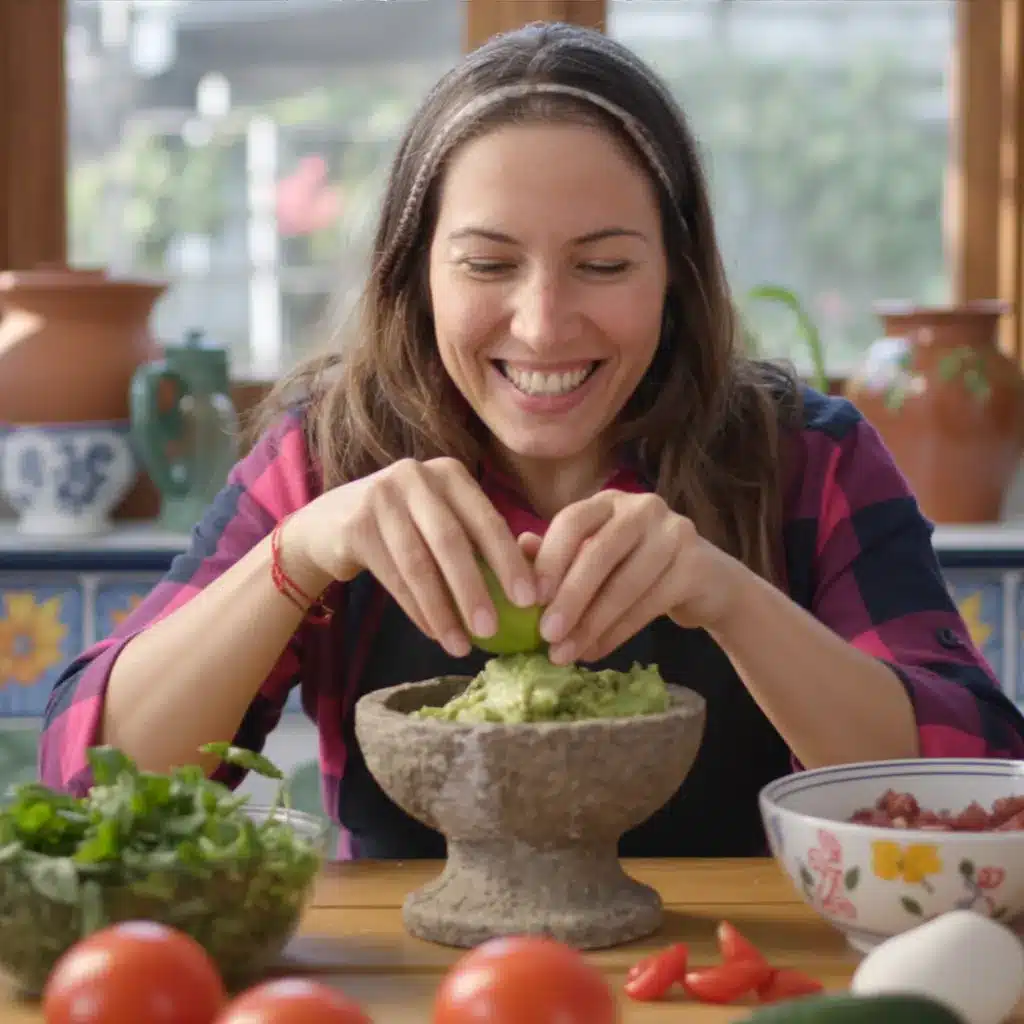Dense bean salad isn’t your average leafy side dish—it’s a colorful, protein-packed powerhouse in a bowl. With a mix of hearty beans, fresh veggies, and vibrant dressings, it delivers flavor, texture, and serious nutrition in every bite. Whether you’re looking for a satisfying lunch, a make-ahead meal prep win, or a plant-based boost, this salad has you covered.
What Does “Dense” Mean in the Context of Bean Salad?
Nutritional Density Explained
In the world of food, the term dense refers to the concentration of nutrients in a given portion. For a bean salad, this means a single serving is packed with essential nutrients such as protein, fiber, vitamins, and minerals. Unlike salads made mostly of leafy greens, bean salads bring substantial nutritional benefits while remaining a light and versatile meal. Moreover, the ingredients in a dense bean salad work together to create a balance of macronutrients and micronutrients, making it an excellent choice for health-conscious eaters.
How Bean Salad Packs a Nutritional Punch
Dense bean salad isn’t just about quantity—it’s about quality too. Beans like chickpeas, black beans, and kidney beans are loaded with plant-based protein and complex carbohydrates. Additionally, they provide a high dose of dietary fiber, supporting gut health and keeping you fuller for longer. Combined with fresh vegetables and a flavorful dressing, the dish offers a variety of textures and flavors while delivering significant health benefits.
The Origins of the Dense Bean Salad Name
Culinary History of Bean-Based Salads
Bean-based salads have a rich history across many cultures. In Mediterranean cuisine, for example, chickpeas have been a staple ingredient for centuries, while Latin American dishes often feature black beans. Over time, the popularity of beans as a nutritious and affordable food item has given rise to creative salad recipes. Dense bean salad, in particular, evolved as a modern, health-focused take on these traditional dishes, emphasizing both flavor and nutritional value.
How the Term “Dense” Reflects Flavor and Texture
The word “dense” in this salad’s name is also a nod to its hearty and satisfying nature. Each ingredient—whether beans, vegetables, or herbs—contributes a unique texture, from the creaminess of chickpeas to the crunch of cucumbers. Moreover, the rich combination of flavors, including earthy beans and zesty dressings, creates a taste profile that feels indulgent yet wholesome. This makes the salad not only nutritious but also deeply satisfying.
Who Should Consider Adding Dense Bean Salad to Their Diet?
Health-Conscious Eaters
For those focused on improving their overall health, dense bean salad is an excellent addition to the menu. It’s rich in fiber, which aids digestion and helps maintain stable blood sugar levels. Furthermore, the salad’s low-fat, high-protein composition makes it ideal for anyone looking to maintain or lose weight without sacrificing taste.
Those Looking for Plant-Based Protein Options
Dense bean salad is particularly beneficial for vegetarians and vegans seeking protein alternatives to meat. The combination of beans ensures a good mix of essential amino acids, which are critical for muscle repair and overall well-being. Additionally, its high iron content helps prevent deficiencies often associated with plant-based diets.
For health-conscious eaters or those exploring plant-based protein options, dense bean salad is an excellent addition to your meals. Additionally, if you enjoy hearty, wholesome recipes, check out this guide to crafting a Caesar Pasta Salad for another nutrient-packed option to try.
Nutritional Insights Behind Dense Bean Salad
Why Should You Eat a Dense Bean Salad Today?

Rich Source of Fiber and Protein
Dense bean salad is celebrated for its remarkable nutritional profile, particularly its high fiber and protein content. Each serving typically includes a mix of legumes like chickpeas, black beans, or lentils, all of which are excellent plant-based protein sources. For example, one cup of chickpeas provides about 15 grams of protein, making it comparable to some animal-based options.
In addition to protein, the fiber in beans supports digestion and helps maintain a healthy gut microbiome. Moreover, fiber promotes satiety, meaning you’ll feel full longer, which can aid in weight management. As a result, this salad is an ideal choice for those seeking a hearty, nutrient-packed meal.
Benefits for Digestion and Energy Levels
The benefits of dense bean salad extend beyond just fiber and protein. Its complex carbohydrates provide steady energy throughout the day, unlike the quick spikes and crashes associated with simple carbs. Additionally, the soluble fiber in beans helps regulate blood sugar levels, making the dish suitable for individuals managing diabetes or blood sugar concerns.
Furthermore, the salad’s combination of beans and vegetables creates a symbiotic effect: the fiber aids digestion, while the vitamins and antioxidants in fresh ingredients like tomatoes and cucumbers enhance nutrient absorption.
Is It Healthy to Eat Bean Salad Every Day?
Evaluating Daily Consumption of Beans
Eating a dense bean salad daily can be highly beneficial, as beans are packed with nutrients essential for long-term health. However, consuming beans regularly requires balance. While beans are rich in protein, fiber, and iron, excessive intake may cause digestive discomfort for some individuals due to their oligosaccharide content, which can lead to bloating or gas.
To avoid these issues, it’s helpful to incorporate a variety of beans and other ingredients into the salad. For instance, rotating between black beans, chickpeas, and lentils can diversify nutrient intake while keeping meals interesting.
Balancing Bean Salad with Other Food Groups
While bean salads are highly nutritious, pairing them with complementary food groups enhances their benefits. For example, adding a side of whole grains, such as quinoa or brown rice, creates a complete protein source, especially important for vegetarians. Additionally, incorporating healthy fats like avocado or olive oil ensures that fat-soluble vitamins are absorbed efficiently. This balanced approach makes daily bean salad consumption both healthy and enjoyable.
What Is the Meaning of Bean Salad?
A Blend of Legumes and Vegetables
At its core, a bean salad is a mix of cooked legumes and fresh vegetables, often seasoned with herbs and dressed with vinaigrette or creamy dressings. However, the exact ingredients and preparation vary widely depending on cultural influences and personal preferences.
For example, a classic Mediterranean bean salad might feature chickpeas, parsley, and a lemon-olive oil dressing, while a Southwest-style variation includes black beans, corn, and a zesty lime-cumin dressing. Regardless of the style, bean salads are unified by their focus on healthy, whole-food ingredients.
Variations Across Cultures and Cuisines
Bean salads are incredibly versatile, and their variations reflect the diversity of global cuisines. In Latin America, black beans are often paired with avocado and cilantro, while in Asia, edamame and sesame seeds provide a unique twist.
Meanwhile, European versions may include cannellini beans, fresh basil, and balsamic vinegar for a sophisticated flavor profile. These cultural influences showcase how bean salads can be adapted to suit any palate or dietary need, making them a universally appealing dish.
Nutritional Insights Behind Dense Bean Salad
Why Should You Eat a Dense Bean Salad Today?
Rich Source of Fiber and Protein
Dense bean salad is an exceptional source of both fiber and protein, two nutrients essential for maintaining overall health. Fiber plays a key role in promoting digestive health by supporting regular bowel movements and feeding beneficial gut bacteria. Meanwhile, protein helps repair tissues, build muscle, and provide sustained energy throughout the day. For those on plant-based diets, the protein content in beans like chickpeas and lentils makes them an ideal alternative to meat. Additionally, the combination of these nutrients helps keep you feeling full and satisfied for longer periods.
Benefits for Digestion and Energy Levels
The high fiber content in beans not only supports gut health but also aids in controlling blood sugar levels. This results in steady energy release, which is especially helpful for avoiding afternoon energy crashes. Furthermore, beans are rich in complex carbohydrates, which provide a slow, consistent supply of energy. Pairing the salad with healthy fats, such as olive oil in the dressing, further enhances its energy-boosting properties. Consequently, eating dense bean salad can make a noticeable difference in both your physical and mental stamina.
Is It Healthy to Eat Bean Salad Every Day?
Evaluating Daily Consumption of Beans
Eating bean salad daily can be a healthy choice, as beans are packed with nutrients that benefit your body in multiple ways. However, consuming beans in moderation is important, as too many can lead to digestive discomfort due to their natural fiber content. Moreover, beans are rich in essential minerals like iron and magnesium, which contribute to long-term health when consumed regularly. For example, incorporating a small portion of dense bean salad into your meals ensures a steady intake of these nutrients without overloading your digestive system.
Balancing Bean Salad with Other Food Groups
While bean salad is a nutritional powerhouse, it’s crucial to balance it with other food groups to create a well-rounded diet. Adding a variety of vegetables, healthy fats, and whole grains to your meals ensures that you get all the essential nutrients. For instance, pairing the salad with a side of quinoa or roasted vegetables can enhance its flavor and nutritional profile. Additionally, rotating beans with other protein sources like tofu or lentils can prevent monotony and support overall dietary diversity.
What Is the Meaning of Bean Salad?
A Blend of Legumes and Vegetables
Bean salad typically combines a variety of legumes with fresh vegetables, herbs, and a flavorful dressing. This blend creates a dish that is not only nutritious but also highly versatile. For example, common ingredients include chickpeas, black beans, and kidney beans, paired with diced cucumbers, tomatoes, and onions. These components are chosen not only for their taste but also for their complementary nutritional benefits. Additionally, the simplicity of the recipe allows for endless customization, making it suitable for various dietary needs and preferences.
Dense bean salad is versatile and can easily be adapted for gluten-free, vegan, or keto diets. For those seeking creative alternatives to traditional meals, try this Burger Bowl Recipe that transforms a classic burger into a nutritious salad, perfect for health-conscious eaters.

Variations Across Cultures and Cuisines
Bean salads are popular worldwide, with each culture adding its unique twist to the dish. For instance, Mediterranean versions often include olive oil, lemon juice, and fresh parsley, while Southwest-inspired salads feature ingredients like corn, avocado, and cilantro. These variations highlight how bean salad can adapt to different flavor profiles and regional ingredients. As a result, it’s a dish that feels familiar yet diverse, offering something new with each preparation.

Dense Bean Salad
Ingredients
Method
- In a large mixing bowl, combine chickpeas, black beans, kidney beans, cherry tomatoes, cucumber, red onion, and parsley.
- In a small bowl or jar, whisk together olive oil, lemon juice, vinegar, honey (if using), cumin, salt, and pepper.
- Pour the dressing over the salad and toss gently until everything is coated and happy together.
- Taste and adjust seasoning if needed — more lemon for brightness, more cumin for warmth.
- Serve immediately or refrigerate for at least 30 minutes to let the flavors mingle. You know, this one’s a crowd favorite every single time.
Nutrition
Notes
Tried this recipe?
Let us know how it was!FAQs
Why Should You Eat a Dense Bean Salad Today?
Dense bean salad is a quick, easy way to get a balanced meal packed with fiber, protein, and essential nutrients. It supports digestion, boosts energy, and keeps you full for longer. Additionally, its versatility allows you to customize it with your favorite vegetables, herbs, or dressings to suit your taste preferences and dietary needs.
Is It Healthy to Eat Bean Salad Every Day?
Yes, eating bean salad daily can be healthy, provided it’s part of a balanced diet. Beans are high in fiber, protein, and minerals like iron and magnesium. However, to prevent digestive discomfort, pair bean salad with other food groups, such as whole grains and fresh vegetables, and rotate different types of beans for variety.
What Is the Meaning of Bean Salad?
A bean salad is a dish that combines legumes like chickpeas, kidney beans, or lentils with fresh vegetables and flavorful dressings. It’s a versatile dish found in many cuisines, with variations that cater to diverse palates. For instance, Mediterranean versions feature olive oil and lemon juice, while Southwest-style salads include lime and cilantro.
What Are the Healthiest Beans to Put in a Salad?
Chickpeas, black beans, and kidney beans are among the healthiest options for a bean salad. Chickpeas are rich in folate and protein, black beans are high in antioxidants, and kidney beans provide ample fiber and iron. Combining different types of beans ensures a broader nutrient profile and a delightful mix of flavors and textures.
Can You Use Canned Beans in a Dense Bean Salad?
Absolutely! Canned beans are a convenient option and retain most of their nutritional value. To maximize their health benefits, rinse them thoroughly to remove excess sodium. Additionally, you can enhance their flavor by mixing them with fresh herbs, spices, and a zesty homemade dressing.
How Long Does a Bean Salad Last in the Refrigerator?
Dense bean salad can last for 3-4 days in an airtight container in the refrigerator. To maintain freshness, store the dressing separately and mix it in just before serving. Additionally, avoid adding ingredients like avocado or soft greens until you’re ready to eat, as they can wilt or brown quickly.
What Are the Best Dressings to Pair with Bean Salads?
The best dressings balance flavor and nutrition. A classic olive oil and lemon juice vinaigrette is a popular choice, as it enhances the beans’ natural flavors. For a creamier option, tahini or yogurt-based dressings work well. Adding spices like cumin or smoked paprika can also elevate the dish, creating a delicious, well-rounded flavor.
Stay Connected with Feel the Recipes
Love cooking and sharing good food? Let’s stay connected! Clara posts new recipes, helpful tips, and little moments from her kitchen every day to keep you inspired.
Join our growing community of home cooks who believe food is meant to be simple, joyful, and shared around the table.
👉 Facebook: Follow us on Facebook
📌 Pinterest: Explore our boards for endless recipe inspiration
🐦 X (Twitter): @feeltherecipes for quick tips and updates
📸 Instagram: @feeltherecipes for fresh photos and behind-the-scenes peeks
Let’s keep cooking, creating, and sharing. Whether you’re here for classic comfort food or something new to try, we’re just a click away.
